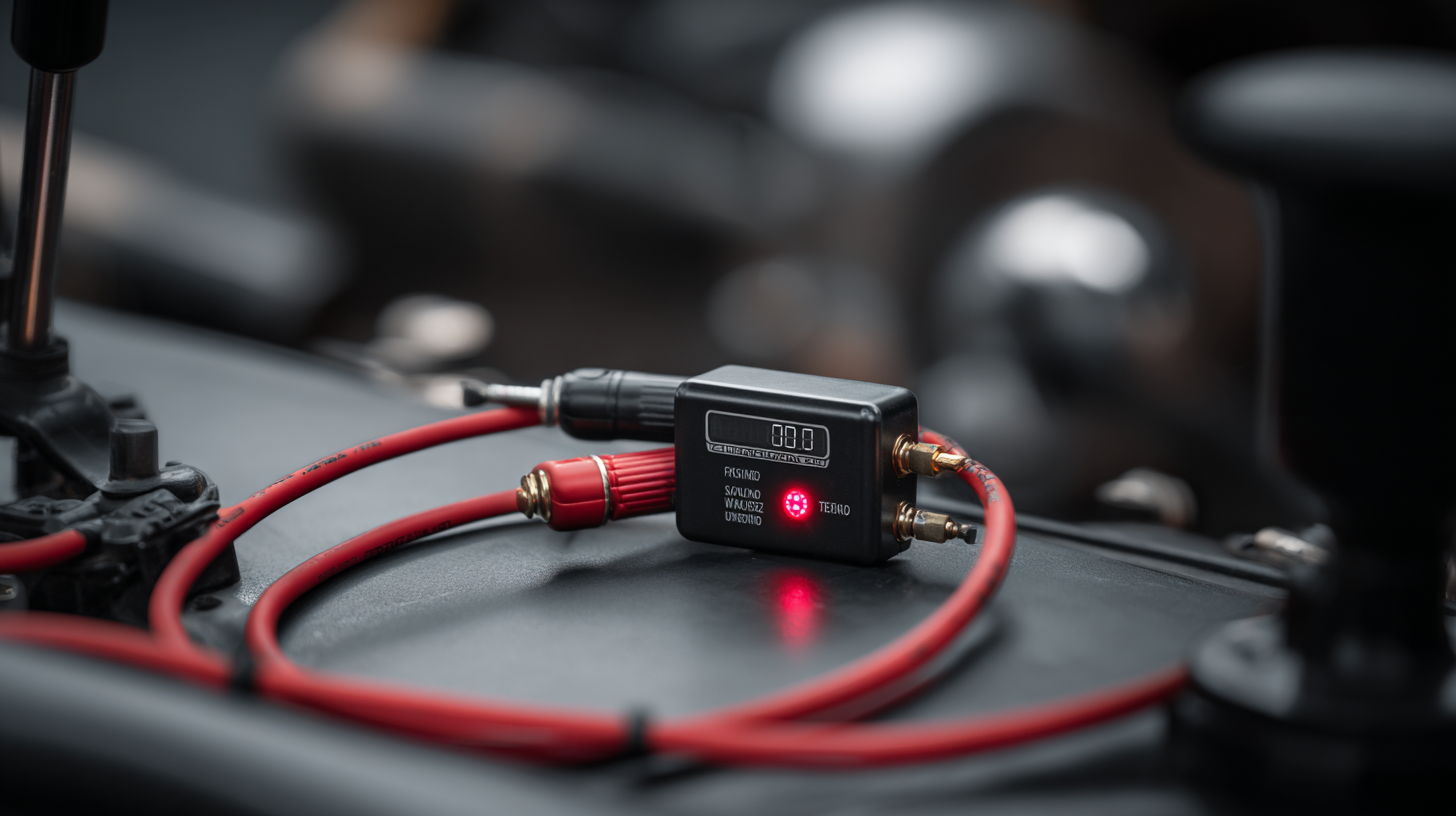Help is here
Understanding the Importance of TPMS Sensor Kits: Enhancing Road Safety and Tire Longevity
In the realm of automotive safety, the importance of tire health cannot be overstated. A critical component in ensuring optimal tire performance and longevity is the Tire Pressure Monitoring System (TPMS) sensor kit. As renowned automotive safety expert Dr. Emily Carter states, "Proper tire maintenance not only enhances fuel efficiency but significantly reduces the risk of tire-related accidents." This underscores the fundamental role that TPMS sensor kits play in modern vehicles, serving as essential tools that alert drivers to tire pressure abnormalities in real time.

TPMS sensor kits are not just accessories but vital guardians of road safety. By providing timely alerts, these sophisticated systems enable drivers to take the necessary actions before small issues escalate into serious threats. Moreover, maintaining appropriate tire pressure can extend the lifespan of tires, leading to cost savings and improved vehicle performance. As we delve deeper into the world of TPMS sensor kits, the focus will be on their capabilities, their contribution to road safety, and how they facilitate enduring tire health for all drivers. Understanding these elements is crucial for any vehicle owner aiming to enhance safety and efficiency on the road.
The Essential Role of TPMS Sensor Kits in Modern Vehicles
TPMS (Tire Pressure Monitoring System) sensor kits play a crucial role in modern vehicles, ensuring that drivers receive real-time information about tire pressure. By continuously monitoring tire conditions, these systems alert drivers to potential issues such as under-inflation or over-inflation, which can lead to hazardous driving situations. Accurate tire pressure is essential not only for vehicle performance but also for optimizing fuel efficiency and reducing tire wear. The ability to address tire issues promptly ultimately enhances road safety and minimizes the risk of accidents caused by tire failure.
Moreover, TPMS sensor kits contribute significantly to tire longevity. Properly inflated tires reduce the rate of tread wear, extending the lifespan of tires and decreasing the frequency of replacements. With the help of TPMS technology, drivers can maintain their tires in optimal condition, leading to significant cost savings over time. In addition, manufacturers are increasingly integrating advanced TPMS features into their vehicles, which reflects a growing recognition of the importance of tire management in overall vehicle safety and durability. Hence, TPMS sensor kits are not just accessories; they are essential components for today's vehicles, promoting safer driving and smarter vehicle maintenance.
Key Benefits of TPMS: Enhancing Tire Performance and Safety
 Tire Pressure Monitoring Systems (TPMS) play a pivotal role in enhancing tire performance and safety. According to a report by the National Highway Traffic Safety Administration (NHTSA), under-inflated tires contribute to about 600 fatalities and 33,000 injuries in car accidents each year. By continuously monitoring tire pressure, TPMS can alert drivers to any significant changes, allowing them to address issues before they escalate into dangerous situations. Maintaining optimal tire pressure not only reduces the risk of blowouts but also improves vehicle handling and fuel efficiency, making it a critical component for road safety.
Tire Pressure Monitoring Systems (TPMS) play a pivotal role in enhancing tire performance and safety. According to a report by the National Highway Traffic Safety Administration (NHTSA), under-inflated tires contribute to about 600 fatalities and 33,000 injuries in car accidents each year. By continuously monitoring tire pressure, TPMS can alert drivers to any significant changes, allowing them to address issues before they escalate into dangerous situations. Maintaining optimal tire pressure not only reduces the risk of blowouts but also improves vehicle handling and fuel efficiency, making it a critical component for road safety.
Moreover, TPMS significantly enhances tire longevity. Data from the Tire Industry Association (TIA) indicates that properly inflated tires can last up to 25% longer than those that are under-inflated. This increased lifespan not only reduces tire waste but also leads to substantial savings for consumers. With a TPMS in place, drivers are more likely to perform regular maintenance and inspections, further contributing to tire health and performance. By investing in a quality TPMS sensor kit, vehicle owners can prioritize both safety and longevity, leading to a smoother and more efficient driving experience.
Understanding How TPMS Sensors Work: A Technical Overview
Tire Pressure Monitoring Systems (TPMS) are crucial for enhancing road safety and extending tire longevity. These sensors continuously monitor tire pressure, providing real-time data to drivers. With research indicating that maintaining optimal tire pressure can improve fuel efficiency by up to 3% and prevent premature tire wear, the technology offers a clear advantage. Innovations in sensor design, such as the lighter and more affordable models now available, are making TPMS more accessible to a wider audience. For instance, recent developments include smaller sensors tailored for bike tires, which attach seamlessly to tubeless valves, ensuring cyclists can also benefit from enhanced safety measures.

The technical workings of TPMS involve the use of microelectromechanical systems (MEMS) to accurately measure pressure fluctuations. These systems have become essential not only in automotive applications but also in various industries including aerospace and medical fields. Advanced MEMS technology allows for precise pressure sensing, crucial for avoiding hazardous blowouts and improving handling performance. Additionally, state-of-the-art TPMS solutions now integrate with navigation systems, offering drivers key insights into tire health alongside route guidance, which is positioning TPMS as an integral part of modern vehicle technology.
Impact of Proper TPMS Maintenance on Tire Longevity
Tire Pressure Monitoring System (TPMS) sensor kits play a crucial role in maintaining optimal tire pressure, significantly impacting tire longevity. Proper maintenance of these systems can enhance tire lifespan by as much as 25%. According to a study published by the National Highway Traffic Safety Administration (NHTSA), under-inflated tires can increase wear and tear on tire components, leading not just to premature tire replacement but also elevating the risk of tire blowouts. Regular checks and maintenance of TPMS can prevent these issues, ensuring that tires operate under safe pressure levels.
Additionally, the Tire Industry Association (TIA) reports that neglecting TPMS maintenance can lead to a decrease in fuel efficiency of up to 3%, directly affecting operating costs for both personal and commercial vehicles. By ensuring that TPMS sensors are functioning correctly and that the tire pressure is maintained within recommended levels, drivers can extend the lifespan of their tires and improve overall vehicle performance. This investment in TPMS maintenance not only enhances road safety but also promotes sustainable driving by reducing unnecessary tire waste.
Impact of TPMS Maintenance on Tire Longevity
Safety Regulations and Standards Surrounding TPMS Technology
Tire Pressure Monitoring System (TPMS) technology plays a crucial role in modern vehicle safety regulations. By continuously monitoring tire pressure, TPMS can alert drivers to under-inflated tires, which not only enhances road safety but also contributes to the longevity of tires. Various safety standards surround TPMS deployment, ensuring that vehicles meet stringent regulations for performance and reliability. Compliance with these regulations not only helps manufacturers avoid penalties but also protects consumers by ensuring a baseline of safety in their vehicles.
Incorporating TPMS is not just about meeting standards; it also underscores the importance of proactive vehicle maintenance. Regularly checking and maintaining tire pressure is essential for optimal performance. Tips for drivers include frequently inspecting tire pressure, especially before long trips, and understanding how to respond to TPMS alerts. When the warning light illuminates, it’s vital to check tire pressure promptly to prevent potential blowouts or tire wear.
Additionally, consider investing in a reliable TPMS sensor kit if your vehicle is older or lacks this technology. A quality sensor kit can enhance your vehicle's safety features, allowing for real-time monitoring. Always refer to your vehicle’s manual for specific TPMS guidelines and maintenance recommendations to ensure your tires remain in top condition for safe travels.
Related Posts
-

Understanding Tire TPMS: How Your Car's Pressure Monitoring System Enhances Safety and Efficiency
-

Understanding the Importance of Tire Service in Reducing Road Accidents and Enhancing Vehicle Safety
-

Understanding the Impact of Tire Valve Sensors on Vehicle Safety and Fuel Efficiency
-

Discover the Health Benefits of Dill Air for Enhanced Wellbeing
-

Exploring the Science Behind Tire Designs for Enhanced Vehicle Performance
-

Unlocking the Secrets of Tire Fluid for Enhanced Vehicle Performance and Safety
